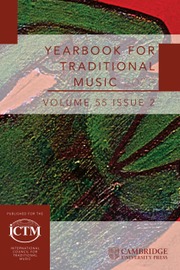No CrossRef data available.
Article contents
Philosophical Problems of being in the Art of the Kazakh Küyshi
Published online by Cambridge University Press: 07 March 2019
Extract
The question of good and evil, of man's place in the world and his relations to the superior powers always played an important role in the traditional arts of the Kazakh. The instrumental music of the Kazakh with its distinctive genre—küy—has embodied philosophical issues as fully as the verbal genres. In Kazakh culture, the connection between instrumental music and dance, movement and gesture is not important. For centuries, instrumental thinking has been formed in close connection with the narrative genres—myth, epos, historical legends, and stories about the life of the küyshy.
- Type
- Articles
- Information
- Copyright
- Copyright © 1990 by the International Council for Traditional Music
Footnotes
Special thanks to Dr. Walter Feldman for transliteration and verification of Kazakh names and terms, and for editorial contributions.




